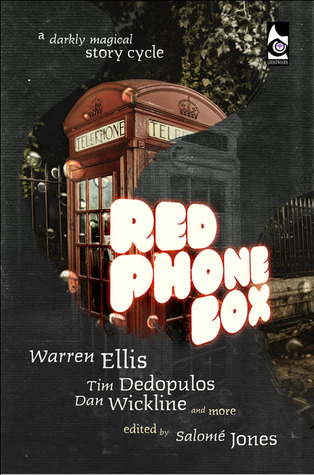Salomé Jones's Blog, page 4
November 24, 2013
The first book I've worked on that's something special
In one week,
Red Phone Box
will be released by Ghostwoods Books. This is the first project I've ever worked on that I feel really proud of.
I couldn't have done it without the help of very many people. I love cooperative projects. Being part of a team makes me really happy. It's part of what I love about being an editor. It's a kind of collaboration with another writer. I lend them my expertise on crafting sentences and give them a fresh set of eyes to look over their work.
With Red Phone Box, I did this times 30, just about. I had a co-editor on this project. There's nothing else to call Tim Dedopulos. He's a genius, literally. After working on the book for so long myself, I needed a fresh set of eyes, too. He's also the king of structure, and this book was a huge challenge in the structure department.
Anyway, it's coming out on Saturday. To be honest, I care more about people reading it than I do about making any money off of it. Because I love fiction. I want books to be amazing, not just cookie cutter stories made from templates, but new, exciting and different. It's a new world all the time. We live IN THE FUTURE. Surely there's so much new stuff to be made use of in books.
That's what we've done -- or tried to do -- with this one.
I'd love you to read it and tell me your thoughts. We're planning a second one and I'd love it to be even better thatn the first. But that can only happen if people read the first one. If you'd like to review the book for your website, you can actually get a free eBook from Ghostwoods Books. Just go here to request a review copy.
We're trying to get some bigger name writers to work with us on the second book, but this can only happen if the first book does well. There's nothing in it for a well-known writer if it only sells a few hundred copies. So please, if you love fiction and want to help it grow, if you like the idea of a fair-trade publisher, that aims to help writers earn a living from their writing and isn't owned by a huge corporation, spread the word about Red Phone Box.
I couldn't have done it without the help of very many people. I love cooperative projects. Being part of a team makes me really happy. It's part of what I love about being an editor. It's a kind of collaboration with another writer. I lend them my expertise on crafting sentences and give them a fresh set of eyes to look over their work.
With Red Phone Box, I did this times 30, just about. I had a co-editor on this project. There's nothing else to call Tim Dedopulos. He's a genius, literally. After working on the book for so long myself, I needed a fresh set of eyes, too. He's also the king of structure, and this book was a huge challenge in the structure department.
Anyway, it's coming out on Saturday. To be honest, I care more about people reading it than I do about making any money off of it. Because I love fiction. I want books to be amazing, not just cookie cutter stories made from templates, but new, exciting and different. It's a new world all the time. We live IN THE FUTURE. Surely there's so much new stuff to be made use of in books.
That's what we've done -- or tried to do -- with this one.
I'd love you to read it and tell me your thoughts. We're planning a second one and I'd love it to be even better thatn the first. But that can only happen if people read the first one. If you'd like to review the book for your website, you can actually get a free eBook from Ghostwoods Books. Just go here to request a review copy.
We're trying to get some bigger name writers to work with us on the second book, but this can only happen if the first book does well. There's nothing in it for a well-known writer if it only sells a few hundred copies. So please, if you love fiction and want to help it grow, if you like the idea of a fair-trade publisher, that aims to help writers earn a living from their writing and isn't owned by a huge corporation, spread the word about Red Phone Box.
Published on November 24, 2013 11:48
November 22, 2013
Book PR Experts aren't really useful for novel publicity
Can you see yourself on The Today Show talking about your urban fantasy novel? Yeah, me either.
Honestly, I will still look at what PR experts are touting as the best ways to promote a book, but I find they're pretty much all the same. Writing a book is not generally a get rich quick type of endeavor. But book PR people will try to convince you that they can make your book a bestseller. The trouble is, they want you to come up with a few thousand dollars in advance.
My take is, learn the basics for yourself and know when you're being scammed. I mean, they're marketers marketing their own products. Why should you believe them?
What do you think?
Honestly, I will still look at what PR experts are touting as the best ways to promote a book, but I find they're pretty much all the same. Writing a book is not generally a get rich quick type of endeavor. But book PR people will try to convince you that they can make your book a bestseller. The trouble is, they want you to come up with a few thousand dollars in advance.
My take is, learn the basics for yourself and know when you're being scammed. I mean, they're marketers marketing their own products. Why should you believe them?
What do you think?
Published on November 22, 2013 16:54
November 11, 2013
The F-Bomb: Writing terrorism or legitimate language in modern fiction?
 WARNING: LANGUAGE
WARNING: LANGUAGEBefore I get started on this topic, let me clarify. I'm pretty sure 'f-bomb' is an American concept. The Brits and Aussies don't hesitate to use the word 'fuck.' In fact, some Brits or Aussie is probably going to laugh at me in the comments for even discussing this topic. Oh well. I've 'ad worse, as the English like to say.
If you're American and you're a writer or a would-be writer who has any writerly education, or even someone who's just read a lot of advice about writing in America, you've probably come across the warning against sprinkling your prose with expletives. In particular the f-word.
If you're American and you're a writer or a would-be writer who has any writerly education, or even someone who's just read a lot of advice about writing in America, you've probably come across the warning against sprinkling your prose with expletives. In particular the f-word.
So the question is, do you have to worry about using it? Will it get you banned from anything, like libraries, or bookstores?
As with everything else in life, it depends.
Rules of thumb
If you're writing for children, obviously swearing will not help you sell books. If you're writing literary fiction, f-bombs will be impact words, most likely. One or two or three of them in the whole book will be okay, but the text is unlikely to need to be littered with them. If you're writing romance, ditto. (Though there are potential exceptions to this rule. For example, if your heroine is from New Jersey, where the f-bomb is affectionately called the 'Jersey comma,' you can probably get away with it.)
If you're writing a gritty urban fantasy, noir, thriller, crime novel, or any other modern dark or even humorous book, sweary language is an option you can play with. It will be in the dialogue, not likely in the narrative (unless the narrative is first person) and it will need to not sound stupid in the context. Context is queen.
So I say all this, but...
I just worked on a very sweary book. I had to warn my parents before I sent it to them. I mean, they watch TV, so they must be used to it by now. I warned them anyway. America is, for the most part, not that sweary of a place. Except New Jersey. Bless you, New Jersey.
An editing client of mine was asked by her publisher to remove at least half the fucks in her manuscript. She did. Then she panicked and decided to put them back in because she felt it weakened the voice. The publisher tried to talk her out of it, while admitting that none of the test readers had objected to it. In the end, the book went to press with all the fucks in place.
If a publisher takes your book which is full of f-bombs, they could still ask you to take some of them out. Or maybe they would ask you to take them out before they accept it. You'd have to decide how important you feel they are. Which is actually a pretty good problem to have, in my opinion.
What's the moral of this story?
Just like with any other word, if you don't need it, don't use it. You don't put curtains on a camel, the saying goes... Actually I just made that saying up, but it's a very effective way of saying that things, including words, are needed where they're needed. Language is language. It comes with the meanings people ascribe to it. So swearing in America is gong to carry more weight and possibly put some people off. Use it appropriately for your genre and your audience. That's the best you can do with any kind of wording.
Now, with all that said, is it okay to use the f-word? Yes.
That's the conclusion I've come to, anyway. I'd like to hear your thoughts on this. Leave 'em in the comments.
Published on November 11, 2013 10:09
November 9, 2013
So now you're a writer
 I've settled into this writing life very seriously now. It's weird because when I wanted to be a writer but had to work at another job, I wondered if I'd ever just be able to apply bottom to chair and stay focused on working, day after day, on my own. Now that I've accomplished it, it's almost scary.
I've settled into this writing life very seriously now. It's weird because when I wanted to be a writer but had to work at another job, I wondered if I'd ever just be able to apply bottom to chair and stay focused on working, day after day, on my own. Now that I've accomplished it, it's almost scary.Because writing, unlike a lot of other work, can eat your life. You can spend all your waking hours doing it. Especially if you love it and you don't have another reason to go out. Like a job, where you work for someone else.
Writing is hard work. It's harder work than I ever thought it was when I was lusting after a career as a writer. I remember telling Warren Ellis once that a novel was a demanding mistress. I have learned that lesson very well for myself now. It makes me understand why Ursula Le Guin is annoyed with the Google book project. It's the amount of work and expertise that goes into writing something truly valuable. It would be hard to see that work out there for everyone to access freely, especially if you were of a generation which grew up well before the advent of the Internet Age.
It's not just a talent. It's an artistic problem. It requires an individual sort of genius. It's complex, composed of layers of words, rhythm, meaning, plot, character, theme, tension, and intrigue. If you were to ask me when I write, my answer might be that I write from 10 in the morning until 2 a.m. That is, all my waking hours. But a more accurate answer is that I write in my sleep -- wake up in the middle of the night with an idea for how to solve a problem in my novel and jump up to write it down before I forget it. I write when standing in line at the corner shop. I write as I walk down the street, putting images into words in my head:a woman balancing, straight-backed as she rides a bicycle, the mottled color and pebbly texture of a brick wall, the color of the sky before a thunderstorm. I can't guarantee that there's any time when part of my brain isn't working on the problem of writing.
I suppose I write this post to caution young writers who would let writing devour their lives before they have anything to write about. I'm going to try again to take a day off per week. Because woman cannot live by writing alone. But if I fail at this, I'll definitely take a break after I finish this novel. Which should be any day now.
Famous last words.
Published on November 09, 2013 12:07
November 3, 2013
Kirkus Gives a Nice Nod to Red Phone Box
"Want to hear something scary?" Tim called out to me while I was in the kitchen making tea.
So much for not opening with dialogue.
I peered around the wall between the kitchen and the living room. "Good scary or bad scary?"
"Neither yet." He gave me a mysterious smile. "The Kirkus review is downloading."
"I'll just be in here." I ducked back into he kitchen and walked around in a little circle for a minute before looking out into the other room again. "You have to promise to tell me what it says. No matter what. Do you promise?" He was focused on his computer screen. I saw him nod slightly, though not to me. He had a faint smile on his face. I think I knew it was going to be okay then.
In a minute, he looked up and said, "They seem to like it."
Then he read it to me. You can read it for yourselves, here. I see it as a really positive review.
I'm pleased with the nod to the editing, but my goal has always been to make the book the best it could be. To me, books are the heralds of potential wonder. Red Phone Box was an experiment, and it apparently worked.
By the way, I'm an editor. You can hire me through Flourish Editing.
So much for not opening with dialogue.
I peered around the wall between the kitchen and the living room. "Good scary or bad scary?"
"Neither yet." He gave me a mysterious smile. "The Kirkus review is downloading."
"I'll just be in here." I ducked back into he kitchen and walked around in a little circle for a minute before looking out into the other room again. "You have to promise to tell me what it says. No matter what. Do you promise?" He was focused on his computer screen. I saw him nod slightly, though not to me. He had a faint smile on his face. I think I knew it was going to be okay then.
In a minute, he looked up and said, "They seem to like it."
Then he read it to me. You can read it for yourselves, here. I see it as a really positive review.
I'm pleased with the nod to the editing, but my goal has always been to make the book the best it could be. To me, books are the heralds of potential wonder. Red Phone Box was an experiment, and it apparently worked.
By the way, I'm an editor. You can hire me through Flourish Editing.
Published on November 03, 2013 10:12
October 21, 2013
Sugar free is hard to get in London
 Homemade sugar free chocolate peanut butter ice milk I'm not a huge ice cream fan, but sugar free ice cream has been my go to treat for a long time. In the US, there are many varieties of decent no sugar added frozen yogurt and ice cream. In England, not so much. I've found two flavours of a brand for diabetics. It's a truly horrible throw back to the days when there were no sweets for people who couldn't or didn't want to eat sugar.
Homemade sugar free chocolate peanut butter ice milk I'm not a huge ice cream fan, but sugar free ice cream has been my go to treat for a long time. In the US, there are many varieties of decent no sugar added frozen yogurt and ice cream. In England, not so much. I've found two flavours of a brand for diabetics. It's a truly horrible throw back to the days when there were no sweets for people who couldn't or didn't want to eat sugar.Not to be discouraged and armed with a small ice cream freezer (the kind where the freezing part has to be frozen in your freezer first) I cobbled together his recipe for chocolate peanut butter ice milk.
Ingredients
2 cups milk (400 ml)
2 1/2 heaping Tbsps Options hot chocolate mix
1 tsp vanilla extract
1/2 c. Splenda (8 Tblsps)
2 eggs
1 T. corn flour (corn starch)
50 gms coarsely chopped dark chocolate
1 heaping Tablespoon peanut butter (I used natural chunky) mixed with 1 tsp Splenda and formed into blueberrysized balls
Beat the eggs with a whisk in a bowl until yellow and smooth. (Not whipped.)
Heat 1 cup (220 ml) milk in a saucepan for about two minutes until hot but not boiling. Pour in a thin stream into eggs, beating with whisk as you go.
Mix remaining cold milk with corn flour and heat in saucepan until corn flour dissolves. Add Options chocolate powder. Stir over heat until just thickened and very smooth. Remove from heat and pour in a thin stream into milk/egg mixture, stirring.
Add 1/2 c Splenda and vanilla and stir.
Allow this mixture to cool down for a few minutes.
Pour into ice cream freezer. Drop in peanut butter balls and pieces of chocolate.
Turn the freezer on and let it stir, checking every 10 - 15 minutes to prevent over-freezing.
If you have any patience left, you can put it in a container and throw it in your freezer to set harder. If you're like me and haven't had ice cream in three years, you will dish it up as soon as it's soft servable and make pleasure noises while you eat it.
Makes four servings.
Published on October 21, 2013 15:05
October 7, 2013
Life in London: Indian food
Indian food has been available in England since the 17th century when the East India Company began bringing Indian spices back to Britain. Obviously colonization led to even stronger ties between Britain and India. Indian food is very popular here, similar to Mexican food in the United States (and that may be the reason why Mexican food is much harder to find here. They don't need it. They have their spicy, exotic food wrapped up.)
Tonight we're having Indian food delivered. Something I've discovered about British Indian food is that there are dishes I never saw on any American Indian restaurant menu. One of my favorites is called Achari. In addition to the various spices and whatever protein you request, if has various kinds of pickles in it. I especially love hot lime pickles, pretty much completely new to me when I arrived here.
 Hot lime pickle. Tasty. If you're in London and in the Maida Vale area, I recommend Tahera, a local restaurant that does excellent achari chicken. They'll deliver through Hungry House or Just Eat, two of those multiple restaurant delivery services.
Hot lime pickle. Tasty. If you're in London and in the Maida Vale area, I recommend Tahera, a local restaurant that does excellent achari chicken. They'll deliver through Hungry House or Just Eat, two of those multiple restaurant delivery services.
Tonight we're having Indian food delivered. Something I've discovered about British Indian food is that there are dishes I never saw on any American Indian restaurant menu. One of my favorites is called Achari. In addition to the various spices and whatever protein you request, if has various kinds of pickles in it. I especially love hot lime pickles, pretty much completely new to me when I arrived here.
 Hot lime pickle. Tasty. If you're in London and in the Maida Vale area, I recommend Tahera, a local restaurant that does excellent achari chicken. They'll deliver through Hungry House or Just Eat, two of those multiple restaurant delivery services.
Hot lime pickle. Tasty. If you're in London and in the Maida Vale area, I recommend Tahera, a local restaurant that does excellent achari chicken. They'll deliver through Hungry House or Just Eat, two of those multiple restaurant delivery services.
Published on October 07, 2013 15:02
October 6, 2013
Your heart, your heart, your heart is on fire...
Now that I can't stop singing this song which I either heard somewhere long ago or made up in my tiny little brain, it's the theme song while I write to you of books and writing. So we're doing a giveaway on Goodreads for Red Phone Box. Here's the giveaway widget, because TECHNOLOGY! (I often want to say things like TECHNOLOGY, BITCHES! but then I feel like it's rude and I get all timid so I don't. Chuck Wendig I ain't.)
.goodreadsGiveawayWidget { color: #555; font-family: georgia, serif; font-weight: normal; text-align: left; font-size: 14px; font-style: normal; background: white; } .goodreadsGiveawayWidget img { padding: 0 !important; margin: 0 !important; } .goodreadsGiveawayWidget a { padding: 0 !important; margin: 0; color: #660; text-decoration: none; } .goodreadsGiveawayWidget a:visted { color: #660; text-decoration: none; } .goodreadsGiveawayWidget a:hover { color: #660; text-decoration: underline !important; } .goodreadsGiveawayWidget p { margin: 0 0 .5em !important; padding: 0; } .goodreadsGiveawayWidgetEnterLink { display: block; width: 150px; margin: 10px auto 0 !important; padding: 0px 5px !important; text-align: center; line-height: 1.8em; color: #222; font-size: 14px; font-weight: bold; border: 1px solid #6A6454; border-radius: 5px; font-family:arial,verdana,helvetica,sans-serif; background-image:url(https://www.goodreads.com/images/layo... background-repeat: repeat-x; background-color:#BBB596; outline: 0; white-space: nowrap; } .goodreadsGiveawayWidgetEnterLink:hover { background-image:url(https://www.goodreads.com/images/layo... color: black; text-decoration: none; cursor: pointer; } Goodreads Book Giveaway Red Phone Box by Salomé Jones
Red Phone Box by Salomé Jones
You'll notice the book is being released November 30th and the books are being given away on November 4th. One of the books is a special edition signed hardcover (signed by 22 of 28 writers of this book). That's something you can't actually get anywhere else.
So, you know, press the button and do its bidding. You could win.
Now sing: Your heart, your heart, your heart is on fire. Your head, your head, your head is on fire. Your life, your life, your life is on fire...
.goodreadsGiveawayWidget { color: #555; font-family: georgia, serif; font-weight: normal; text-align: left; font-size: 14px; font-style: normal; background: white; } .goodreadsGiveawayWidget img { padding: 0 !important; margin: 0 !important; } .goodreadsGiveawayWidget a { padding: 0 !important; margin: 0; color: #660; text-decoration: none; } .goodreadsGiveawayWidget a:visted { color: #660; text-decoration: none; } .goodreadsGiveawayWidget a:hover { color: #660; text-decoration: underline !important; } .goodreadsGiveawayWidget p { margin: 0 0 .5em !important; padding: 0; } .goodreadsGiveawayWidgetEnterLink { display: block; width: 150px; margin: 10px auto 0 !important; padding: 0px 5px !important; text-align: center; line-height: 1.8em; color: #222; font-size: 14px; font-weight: bold; border: 1px solid #6A6454; border-radius: 5px; font-family:arial,verdana,helvetica,sans-serif; background-image:url(https://www.goodreads.com/images/layo... background-repeat: repeat-x; background-color:#BBB596; outline: 0; white-space: nowrap; } .goodreadsGiveawayWidgetEnterLink:hover { background-image:url(https://www.goodreads.com/images/layo... color: black; text-decoration: none; cursor: pointer; } Goodreads Book Giveaway
 Red Phone Box by Salomé Jones
Red Phone Box by Salomé Jones Giveaway ends November 04, 2013.
See the giveaway details at Goodreads.
Enter to win (But look at that thing. I think I like it because it has a button. I'm a big fan of buttons that do things. I could easily be lured into a dangerous situation if there were buttons to push. A bigger sucker for buttons there never was. )You'll notice the book is being released November 30th and the books are being given away on November 4th. One of the books is a special edition signed hardcover (signed by 22 of 28 writers of this book). That's something you can't actually get anywhere else.
So, you know, press the button and do its bidding. You could win.
Now sing: Your heart, your heart, your heart is on fire. Your head, your head, your head is on fire. Your life, your life, your life is on fire...
Published on October 06, 2013 06:26
September 25, 2013
Why does it take so long to get a book out? Book development and the slow pace of publishing
I've been working on Red Phone Box in its post-writing stages since March. How on earth can it have taken so long, you may ask? My dad asked me the same question.
"I would've thought you'd be on to the next thing," he told me when I said I was still working on it.
Writing a book is a hard job. Writing a book with 27 other people is easier in some ways, and harder in others. Yes, you have other people to do some of the writing. But then you have 28 brains whose madness has to be reconciled.
So have we just been sitting around eating bonbons for months. Bonbons? We don't have time for any freaking BONBONS. (Don't touch those, I'm saving them for later. )
If you've never been through this book stuff with a publisher, it's fun to see what goes on.
Red Phone Box started as a concept. I wanted to do something like a huge game of Exquisite Corpse except that each person would write a whole story-chapter instead of just two lines. Apparently everyone thought I was crazy, but they decided to play along anyway. Leaving aside the process of putting all the stories together, there was also a lot of rereading. When a book gets too long for you to look at it easily in a glance, there are multiple rereadings, revisions, and proofreadings. This book was proofed in the digital by me and about six other people. Then it was proofed on paper by Tim Dedopulos and on a Kindle Paperwhite by me. We were making changes to it, fixing typos or places we decided needed a bit more editing right until we turned it in to Kirkus and sent the galleys to the printer.
There was also the layout in four different formats (so far--the hardcover layout still remains to be finished). And then after the layout, we looked it over again. At that point, any change had to be made on four different editions.
Already hundreds of hours of work had gone into the book before we got to this stage. It started to seem like we'd never see the light of day. Eternal darkness and woe covered bookland. Until today, when we received the loose proof pages from the printer.
"I would've thought you'd be on to the next thing," he told me when I said I was still working on it.
Writing a book is a hard job. Writing a book with 27 other people is easier in some ways, and harder in others. Yes, you have other people to do some of the writing. But then you have 28 brains whose madness has to be reconciled.
So have we just been sitting around eating bonbons for months. Bonbons? We don't have time for any freaking BONBONS. (Don't touch those, I'm saving them for later. )
If you've never been through this book stuff with a publisher, it's fun to see what goes on.
Red Phone Box started as a concept. I wanted to do something like a huge game of Exquisite Corpse except that each person would write a whole story-chapter instead of just two lines. Apparently everyone thought I was crazy, but they decided to play along anyway. Leaving aside the process of putting all the stories together, there was also a lot of rereading. When a book gets too long for you to look at it easily in a glance, there are multiple rereadings, revisions, and proofreadings. This book was proofed in the digital by me and about six other people. Then it was proofed on paper by Tim Dedopulos and on a Kindle Paperwhite by me. We were making changes to it, fixing typos or places we decided needed a bit more editing right until we turned it in to Kirkus and sent the galleys to the printer.
There was also the layout in four different formats (so far--the hardcover layout still remains to be finished). And then after the layout, we looked it over again. At that point, any change had to be made on four different editions.
Already hundreds of hours of work had gone into the book before we got to this stage. It started to seem like we'd never see the light of day. Eternal darkness and woe covered bookland. Until today, when we received the loose proof pages from the printer.
Published on September 25, 2013 10:08
August 19, 2013
On What Chuck Palahniuk Said
What writer Chuck Palahniuk said (among many other things he's said) in this article can be summed up as, 'for six months don't use thought verbs.' He gives a list. I always panic slightly when I see articles like this by prolific, famous, accomplished writers. OH NO. I've used thought words. I'm DOOOOMED. Then the part of my brain that actually thinks kicks in.
So then I realize he's showing you how to show, not tell. Often when you're trying to teach a writer to do something differently from the way that is her/his habit, you suggest they stop doing something completely. Like, stop using 'to be' verbs or adverbs. The reasoning, I think, is that it's much easier to see what's wrong if you stop doing the thing that's causing the problems. It's like you tell an alcoholic not to drink any alcohol instead of just cutting back. Most people can't manage if they cut back. They need to stop entirely before they can get a grip.
What I don't think Palahniuk's saying is 'never use thought words again.' He's saying, learn how to show.
I also don't think he's saying, 'don't reveal a character's interior.' He's saying you won't actually reveal it through summary. But that's a difficult concept for many to actually apply. So he gives it in more concrete terms. If you avoid using the words he mentions in the article, you're far less likely to resort to summary. You'll be forced to spell things out. (CP hopes you will anyway. I'm not sure. It's still a hard concept for people to grasp. I'm imagining some very inventive ways people will find to keep using summary, carefully skirting those particular words.)
Probably now isn't the time to mention this but I will anyway, lest you get carried away. It's okay to tell sometimes. There are definitely times when you would bore the pants off everyone if you spelled certain details out in an effort to always show. For example: 'It happened again the next day' summarizes something you already spelled out. If you wrote out the whole thing again (and this becomes more true the more times this thing happens) just to avoid using six words of summary, your book might burst into flames. Or maybe that would just be the readers' heads.
So if you like writing interior characters, I'd say don't panic. And don't hate Chuck Palahniuk. His advice is solid. Just see it for what it is.
So then I realize he's showing you how to show, not tell. Often when you're trying to teach a writer to do something differently from the way that is her/his habit, you suggest they stop doing something completely. Like, stop using 'to be' verbs or adverbs. The reasoning, I think, is that it's much easier to see what's wrong if you stop doing the thing that's causing the problems. It's like you tell an alcoholic not to drink any alcohol instead of just cutting back. Most people can't manage if they cut back. They need to stop entirely before they can get a grip.
What I don't think Palahniuk's saying is 'never use thought words again.' He's saying, learn how to show.
I also don't think he's saying, 'don't reveal a character's interior.' He's saying you won't actually reveal it through summary. But that's a difficult concept for many to actually apply. So he gives it in more concrete terms. If you avoid using the words he mentions in the article, you're far less likely to resort to summary. You'll be forced to spell things out. (CP hopes you will anyway. I'm not sure. It's still a hard concept for people to grasp. I'm imagining some very inventive ways people will find to keep using summary, carefully skirting those particular words.)
Probably now isn't the time to mention this but I will anyway, lest you get carried away. It's okay to tell sometimes. There are definitely times when you would bore the pants off everyone if you spelled certain details out in an effort to always show. For example: 'It happened again the next day' summarizes something you already spelled out. If you wrote out the whole thing again (and this becomes more true the more times this thing happens) just to avoid using six words of summary, your book might burst into flames. Or maybe that would just be the readers' heads.
So if you like writing interior characters, I'd say don't panic. And don't hate Chuck Palahniuk. His advice is solid. Just see it for what it is.
Published on August 19, 2013 02:30



